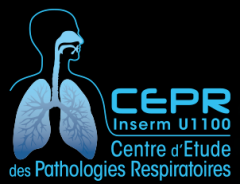Respiratory diseases have a significant impact from a medical and socioeconomic viewpoint. The World Health Organisation (WHO) consequently classifies pneumonia and chronic obstructive pulmonary disease (COPD) among the ten leading causes of death worldwide, accounting for 10 million deaths per year [source: European Lung White Book, 2003]. In Europe, the direct cost of the associated healthcare alone is at least 55 billion Euros annually, and when the indirect consequences are factored in (incapacity, life-years lost), the cost rises to close to 380 billion Euros. Despite this critical situation, the existing treatments are limited as they relieve some symptoms, but are seldom curative. These data underscore the urgent need to develop innovate research with the aim of achieving a better understanding of the pathophysiology of respiratory diseases and formulating more effective devices for targeted therapy.
Respiratory diseases have a major impact in medical and socio-economic terms. It is against this backdrop that the Center for Respiratory Diseases (CEPR) is aimed to develop innovative research that gives a better understanding of the pathophysiology of these diseases and improves inhalation therapy devices and aided by the numerous complementary resources of expertise existing within the 3 teams. In fact, CEPR’s staff includes immunologists, microbiologists, biochemists with an expertise in proteases and antiproteases, experts in aerosoltherapy, experts in murine and primate models of lung diseases as well as clinicians, all nationally and internationally recognised in their respective fields. Such diversity is an asset that allows for the development of research that is collaborative, translational as well as productive, and aimed at improving the treatments for two types of respiratory diseases.
Full Text178
|
Bibliographic references218
|
Open Access77 %
|
Keywords
Latest publications
-
-
Lucille Lamendour, Mäelle Gilotin, Nora Deluce-Kakwata Nkor, Zineb Lakhrif, Daniel Meley, et al.. Bispecific antibodies tethering innate receptors induce human tolerant-dendritic cells and regulatory T cells. Frontiers in Immunology, 2024, 15, pp.1369117. ⟨10.3389/fimmu.2024.1369117⟩. ⟨hal-04601179⟩
-
-
-
Pierre Bay, Étienne Audureau, Sébastien Préau, Raphael Favory, Aurélie Guigon, et al.. COVID-19 associated pulmonary aspergillosis in critically-ill patients: a prospective multicenter study in the era of Delta and Omicron variants. Annals of Intensive Care, 2024, 14 (1), pp.65. ⟨10.1186/s13613-024-01296-0⟩. ⟨hal-04577615⟩
-
-
-
Julie Tottey, Gilles Lalmanach. Functional characterisation of cysteine cathepsins as new virulence factors in the apicomplexan parasite Cryptosporidium parvum. Journées d'Animation Scientifique de la Fédération de Recherche en Infectiologie (FéRI), Fédération de Recherche en Infectiologie (FéRI), Jul 2023, Tours (France), France. ⟨hal-04395670⟩
-
Julie Mankikian, Agnès Caille, Martine Reynaud-Gaubert, Marie-Sara Agier, Julien Bermudez, et al.. Rituximab and mycophenolate mofetil combination in patients with interstitial lung disease (EVER-ILD): a double-blind, randomised, placebo-controlled trial. European Respiratory Journal, 2023, 61 (6), pp.2202071. ⟨10.1183/13993003.02071-2022⟩. ⟨hal-04113217v2⟩
-
Bertrand Hermann, Sarah Benghanem, Youenn Jouan, Antoine Lafarge, Alexandra Beurton. The positive impact of COVID-19 on critical care: from unprecedented challenges to transformative changes, from the perspective of young intensivists. Annals of Intensive Care, 2023, 13 (1), pp.28. ⟨10.1186/s13613-023-01118-9⟩. ⟨inserm-04118180⟩
